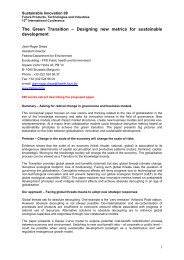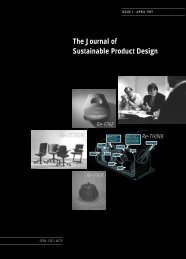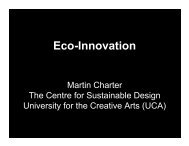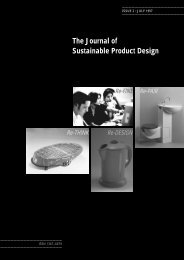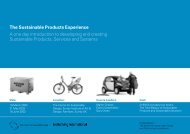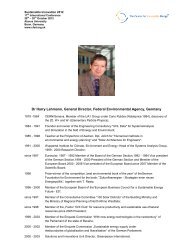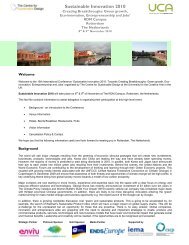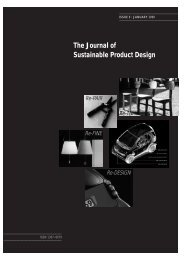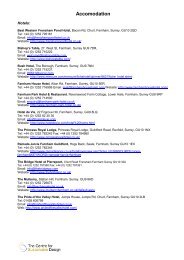Country report on the Indian electronics sector - The Centre for ...
Country report on the Indian electronics sector - The Centre for ...
Country report on the Indian electronics sector - The Centre for ...
You also want an ePaper? Increase the reach of your titles
YUMPU automatically turns print PDFs into web optimized ePapers that Google loves.
20 · Asia Eco-Design Electr<strong>on</strong>ics (AEDE)<br />
5.3 L<strong>on</strong>g-term capacity building measures<br />
As <strong>the</strong> industry and <strong>the</strong> ec<strong>on</strong>omy moves up <strong>the</strong> learning curve,<br />
enhancing competitive advantage in <strong>the</strong> global arena through<br />
innovati<strong>on</strong> would assume significance. This will be a critical<br />
element of l<strong>on</strong>g-term capacity building measures. Building <strong>on</strong><br />
<strong>the</strong> achievements in <strong>the</strong> short and medium-term and extending<br />
<strong>the</strong>se initiatives will also c<strong>on</strong>stitute <strong>the</strong> l<strong>on</strong>g term agenda.<br />
In <strong>the</strong> l<strong>on</strong>g-term, <strong>the</strong> <strong>Indian</strong> industry has to strategically positi<strong>on</strong><br />
itself to effectively resp<strong>on</strong>d to global envir<strong>on</strong>ment management<br />
practices and new developments in US, Europe and Japan.<br />
Securing a firm positi<strong>on</strong> in <strong>the</strong> global supply chain and initiating<br />
corporate social resp<strong>on</strong>sibility (CSR) through improved<br />
stakeholder engagement should be a priority in <strong>the</strong> l<strong>on</strong>g term.<br />
For propagating and sustaining envir<strong>on</strong>ment management<br />
best practices in <strong>the</strong> l<strong>on</strong>ger-term, a group of leading<br />
companies setting industry benchmarks can make <strong>the</strong>ir<br />
professi<strong>on</strong>als available <strong>for</strong> training and implementing clean<br />
technology processes <strong>for</strong> a fee. Part of <strong>the</strong> fee could be<br />
borne by sp<strong>on</strong>sors and agencies champi<strong>on</strong>ing <strong>the</strong> cause of<br />
envir<strong>on</strong>mental protecti<strong>on</strong>. This activity could be coordinated by<br />
industry associati<strong>on</strong>s like ELCINA as part of its newly created<br />
Envir<strong>on</strong>ment Cell. All such initiatives have to be taken up at<br />
<strong>the</strong> nati<strong>on</strong>al level with <strong>the</strong> aim of reaching out to as many<br />
companies as possible.<br />
<strong>The</strong> Government has a key role to play in l<strong>on</strong>g-term capacity<br />
building. In particular, it needs to:<br />
f Devise support systems including infrastructure development<br />
to bring down compliance costs<br />
f Track global compliance requirements <strong>on</strong> an <strong>on</strong>going basis<br />
and develop appropriate policy agenda and implementati<strong>on</strong><br />
programmes. A senior officer with decisi<strong>on</strong>-making powers<br />
(Director or Joint Secretary) from <strong>the</strong> MOEF (Ministry of<br />
Envir<strong>on</strong>ment and Forests) needs to be assigned to <strong>the</strong> MC&IT<br />
(Ministry of Communicati<strong>on</strong>s and IT) to evaluate all technical<br />
issues and develop a better understanding <strong>on</strong> compliance<br />
challenges. This collaborati<strong>on</strong> between <strong>the</strong> two Ministries<br />
is critical <strong>for</strong> sharing resp<strong>on</strong>sibilities and addressing <strong>the</strong><br />
challenges.<br />
f Support design, testing, tooling, training <strong>for</strong> EMS compliance<br />
targeting as many SMEs as possible. This could be d<strong>on</strong>e<br />
jointly with <strong>the</strong> industry, training instituti<strong>on</strong>s, academia and<br />
o<strong>the</strong>r enabling agencies.<br />
Summarising <strong>the</strong> capacity building measures required, <strong>the</strong><br />
primary acti<strong>on</strong>s required are :<br />
f Prepare clear standards <strong>on</strong> RoHS, WEEE, EuP, LPEUR,<br />
HARL and eco-design as guidelines <strong>for</strong> <strong>the</strong> <strong>Indian</strong> industry<br />
f Support training and in<strong>for</strong>mati<strong>on</strong> disseminati<strong>on</strong> <strong>on</strong> sustainable<br />
trade and envir<strong>on</strong>mental issues to <strong>the</strong> industry which would<br />
encourage <strong>the</strong>m to be proactive <strong>on</strong> <strong>the</strong> issue<br />
f Active engagement of <strong>the</strong> government <strong>on</strong> all aspects critical<br />
<strong>for</strong> success ranging from creating standards, legislati<strong>on</strong>,<br />
training as well as promoti<strong>on</strong> of testing and recycling facilities.<br />
f Creati<strong>on</strong> of public awareness <strong>on</strong> envir<strong>on</strong>mental issues and<br />
<strong>the</strong> encouragement of corporates to actively participate and<br />
support programmes.



